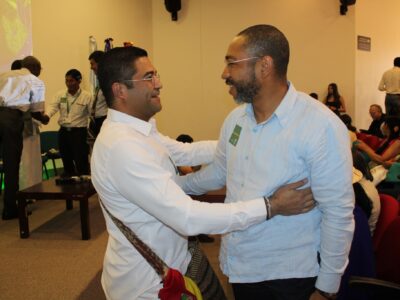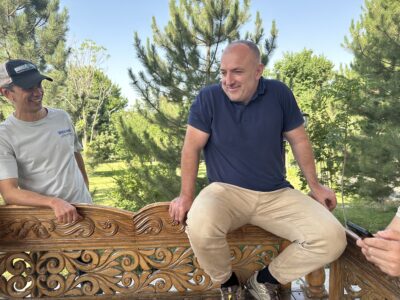
Knowledge sharing events are a key tool of Collaborating, Learning, and Adapting (CLA) approaches. These events are an opportunity for USAID implementing partners, governmental agencies, NGOs, project participants, and other stakeholders to convene, exchange experiences, and learn from one another. It is critical to understand the audience of such an event and thoughtfully organize it so that all can truly engage and participate in an inclusive manner.
In December 2023, the Victory Against Malnutrition Plus (ViMPlus) Activity in Burkina Faso, which is funded by USAID’s Bureau for Humanitarian Assistance and implemented by ACDI/VOCA, held a two-day foire aux savoirs, or knowledge sharing event. The event brought together over 200 resilience practitioners, including ViMPlus Activity participants from the Centre-Nord Region, traditional leaders, state actors, local NGO partners, USAID staff, and Resilience in the Sahel Enhanced II (RISE II) implementing partners. ViMPlus Activity participants played an active role in the knowledge sharing event, leading group discussions, sharing testimonials, and presenting their accomplishments and activities through poster presentations.

What made the foire aux savoirs such a success?
We spoke with Lucien Ouali, the ViMPlus Activity’s Deputy Chief of Party, about what made learning and exchange among participants possible. “I wanted to have an event where people had multiple opportunities to talk to each other and hear information in different ways,” Ouali said. “Yes, we had presentations and excellent guest speakers from the partners we work with on the ground. But it was also important for people to feel encouraged to engage in open, honest discussions about how they are addressing challenges.” Ouali added table discussions, a photo gallery, and poster presentations to provide more opportunities for people to network with like-minded resilience practitioners.
“I was so happy when I heard the noise in the room get really loud. It meant that everyone was really excited about the conversations they were having.”
Lucien Ouali, the ViMPlus Activity’s Deputy Chief of Party
Below, Ouali shares his lessons learned and guidance for fostering inclusive participation in knowledge sharing events:
- Planning and logistics
- Develop an agenda that includes diverse opportunities for interaction (both visual and verbal) among event participants, such as poster sessions, a photo gallery, and small discussion groups.
- Work with local partners, such as NGOs, to maximize the presence of local participants at the event by ensuring invitations and logistics are clear.
- Identify as many opportunities as possible for local participants to present and share their experiences and ideas with others.
- Ensure local participants are seated in a central location within the room to highlight the importance of their participation and involvement in the event.

- Event facilitation
- Ensure two-way translation for local participants, if needed. For the ViMPlus Activity’s foire aux savoirs, participants used headsets for simultaneous translation from French to Mooré, a local language. They were encouraged to share their insights and perspectives in the language they felt most comfortable speaking, and translation was provided for other event attendees.
- Ensure familiar faces are present to reassure local participants. During the foire aux savoirs, local NGO staff guided local participants and provided ad hoc translation support.
- Use the event as a platform to conduct one-on-one interviews with local participants in their preferred language, with NGO staff providing translation support. During the foire aux savoirs, interviews were conducted during coffee breaks to directly engage with local participants and hear their stories.

- Actively encourage local participants to ask and respond to questions during plenary and group discussions.
- Have small group discussions with only local participants to foster connections and build networks.
- Build on the learning outcomes of the event by creating a publicly available repository of relevant resources, such as copies of posters, presentations, technical documents, and an event report to be shared with attendees and other potential stakeholders.
Looking for more guidance on best practices for hosting inclusive knowledge sharing events? The USAID Resilience Learning Activity’s knowledge sharing event tracker template, developed by ACDI/VOCA, guides event organizers through the process of planning, implementation, and amplification to bring in and encourage diverse perspectives and experiences.
Comments




